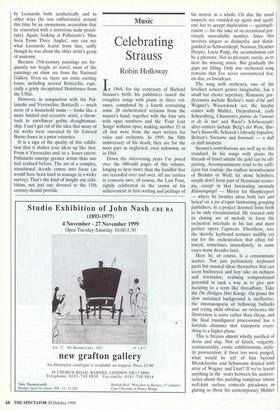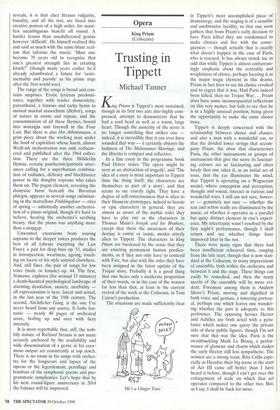Music
Celebrating Strauss
Robin Holloway
In 1964, for the centenary of Richard Strauss's birth, his publishers issued the complete songs with piano in three vol- umes, completed by a fourth containing some 20 orchestrated versions from the master's hand, together with the four sets with opus numbers and the 'Four Last Songs' without opus, making another 15 in all that were from the start written for voice and orchestra. In 1999, the 50th anniversary of his death, they are for the most part as neglected, even unknown, as in 1964.
Down the intervening years I've pored over the 600-odd pages of this volume, longing to hear more than the handful that are recorded over and over. All are rarities in concerts save, of course, the Last Four, rightly celebrated as the crown of his achievement in lyric writing and perhaps of his oeuvre as a whole. On disc the usual suspects are rounded up again and again: one has to accept duplication — quintupli- cation — for the sake of an occasional pre- viously unavailable number. Since this involves singers as distinctive and distin- guished as Schwartzkopf, Norman, Heather Harper, Lucia Popp, the accumulation can be a pleasure. Not so pleasant, surely, as to hear the missing music. But gradually the gaps are filling. Only one orchestral song remains that I've never encountered live, on disc, or broadcast.
The song with orchestra, one of the loveliest concert genres imaginable, has a small but choice repertory. Romantic pre- decessors include Berlioz's nuits d'ite and Wagner's Wesendonck set; the heyday comes with Mahler, Diepenbrock, early Schoenberg, Chausson's poeme de l'amour et de la mer and Ravel's Schiliemzade; after-corners include Berg's der Wein, Bar- ber's Knoxville, Schoeck's lebendig begraben, Britten's Nocturne and Serenade — a dull or duff moment.
Strauss's contributions are well up to this standard. In his songs with piano the threads of tinsel amidst the gold can be off- putting. Accompaniments tend to be suffi- cient but routine: the endless inventiveness of Brahms or Wolf, let alone Schubert, simply don't form part of Straussian econo- my, except in that fascinating anomaly Kramerspiegel — Mirror for Shopkeepers — where he lavishes ideas both tart and lyrical on a jeu d'esprit lambasting grasping publishers, in a project doomed from birth to be only circumstantial. He rescued only its closing arc of melody to form the orchestral interlude in his last and most perfect opera Capriccio. Elsewhere, too, the sketchy keyboard textures audibly cry out for the orchestration that often fol- lowed, sometimes immediately, in some cases many decades later.
Here he, of course, is a consummate master. Not just perfunctory keyboard parts but musical ideas themselves that can seem hackneyed and lazy take on richness and resonance, realising compositional potential in such a way as to give new meaning to a term like threadbare. Take the Die Heiligen Drei Konige. On piano the slow sustained background is ineffective, the onomatopoeia of bellowing bullocks and crying child obvious: on orchestra the illustration is naive rather than cheap, and the final transfigured processional has a fairytale shimmer that transports every- thing to a higher plane.
This is Strauss almost wholly purified of dross and slag. Not of kitsch, vulgarity, sentimentality, erotic exhibitionism, stylis- tic provocation: if these too were purged, what would be left of him beyond Mendelssohn and Schumann doused with attar of Wagner and Liszt? If we've learnt anything in the years between his anniver- saries about this puzzling composer whose well-knit surface conceals paradoxes as glaring as those his contemporary Mahler reveals, it is that chez Strauss vulgarity, banality, and all the rest, are fused into creative powers of a high order, for mani- fest unambiguous benefit all round. A harder lesson than unadulterated genius however 'difficult'. He himself realised this and said as much with the same blunt real- ism that informs the music: 'Must one become 70 years old to recognise that one's greatest strength lies in creating kitsch?' (though many years earlier he'd already adumbrated a future for 'senti- mentality and parody' as his prime urge after the first world war).
The range of the songs is broad and con- tains surprises. Erotic lyricism predomi- nates, together with tender domesticity, parenthood, a famous and tacky hymn to mutual marital masochism (Befreit), songs of nature in storm and repose, and the consummation of all these themes, bound into nostalgia and farewell in the Four Last. But there is also Der Arbeitsmann, a grim piece about the working man under the hoof of capitalism whose harsh, almost Weill-ish orchestration was only rediscov- ered and published after the 1964 collec- tion. There are the three Holderlin Hymns, ecstatic pantheistic/patriotic utter- ances calling for a superhuman combina- tion of radiance, delicacy and blockbuster power in the doughty soprano who .takes them on. The pagan element, revealing the dionysiac furor beneath the Bavarian phlegm, appears in several songs culminat- ing in the marvellous Frithlingsfeier — rites of spring — admittedly another orchestra- tion of a piano original, though it's hard to believe, hearing the orchestra's' seething frenzy, that the piano was anything more than a stopgap.
Unwonted excursions from soaring soprano to the deeper voices produces the best of all (always excepting the Last Four): a pair for deep bass op. 51, studies in introspection, weariness, ageing, touch- ing on facets of his style untried elsewhere. And, still finer, the pair of songs for low voice (male or female) op. 44. The first, Notturno, explores (for around 15 minutes) a death-haunted psychological landscape of alarming desolation, anxiety, morbidity all expressionism is here, latent and actual, in the last year of the 19th century. The second, Michtlicher Gang, is the one I've never heard from any source. It looks fan- tastic — nearly 40 pages of orchestral score, boiling up and over with fiery intensity.
It is most regrettable that, still, the wob- bfly stature of Richard Strauss is not more securely anchored by the availability and wide dissemination of a genre in his enor- mous output set consistently at top notch. There is no room in his songs with orches- tra for the longueurs and lapses of the operas or the legerdemain, persiflage and bombast of the symphonic poems and pro- grammatic symphonies. Let's hope that by his next round-figure anniversary in 2014 the balance will be improved.



























































































 Previous page
Previous page